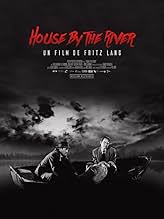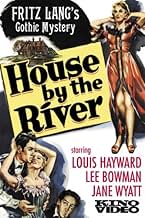IMDb-BEWERTUNG
7,0/10
4377
IHRE BEWERTUNG
Ein verwirrter Schriftsteller ermordet ein Dienstmädchen, nachdem sie sich seinen Vorschüssen widersetzt. Der Autor bittet die Hilfe seines Bruders, die Leiche zu verstecken, und beobachtet,... Alles lesenEin verwirrter Schriftsteller ermordet ein Dienstmädchen, nachdem sie sich seinen Vorschüssen widersetzt. Der Autor bittet die Hilfe seines Bruders, die Leiche zu verstecken, und beobachtet, wie der Bruder zum Hauptverdächtigen wird.Ein verwirrter Schriftsteller ermordet ein Dienstmädchen, nachdem sie sich seinen Vorschüssen widersetzt. Der Autor bittet die Hilfe seines Bruders, die Leiche zu verstecken, und beobachtet, wie der Bruder zum Hauptverdächtigen wird.
Bob Burns
- Courtroom Spectator
- (Nicht genannt)
Edgar Caldwell
- Square Dancer
- (Nicht genannt)
Edward Clark
- Minor Role
- (Nicht genannt)
Frank Dae
- Col. Davis
- (Nicht genannt)
Handlung
WUSSTEST DU SCHON:
- WissenswertesFritz Lang originally wanted a black woman to play the role of Emily Gaunt, but the producers refused.
- PatzerThe women are dressed in turn of the century type clothing but the men are wearing modern hats and suits.
- Zitate
John Byrne: You must be very, very ill Stephen...
Stephen Byrne: Ill?
- VerbindungenFeatured in Le documentaire culturel: Das Verhängnis des Doktor Frankenstein (2018)
- SoundtracksTurkey in the Straw
(uncredited)
American folk song
Author unknown
Ausgewählte Rezension
For some reason, the great director chose to degrade this film on some occasions, yet at other times he would revel in details of the film's opening quarter-hour. However, at the time that he made this film, he was despondent over the collapse of his Diana Productions which was a co-venture with Joan Bennett and her husband Walter Wanger. With no offers in sight from the majors, Lang chose to visit "Poverty Row" which may have left him with bad memories of a film of which he should have been more pleased.
In HOUSE BY THE RIVER, we have Lang working at the bargain basement Republic Pictures, where Orson Welles had just made a similar descent to make MACBETH. In each case, the decline was only in budget, not in quality. In Lang's case, we have a film that plays as a great companion piece to his SECRET BEHIND THE DOOR, both being a change of pace Gothic thriller from the master of spies and noir.
Incidentally, the promise of artistic freedom offered at Republic did stop when Lang attempted to cast a black actress as the maid. We're just lucky that Vera Hruba Ralston (wife of company head Yates) wasn't cast as the wife.
The screenwriter, Mel Dinelli, working from the A.P. Herbert novel, was a past and future hand at these "house" mellers - he previously did the screenplay for THE SPIRAL STAIRCASE and would do BEWARE, MY LOVELY in 1952. He segued well from Robert Siodmak to Fritz Lang as long-time Langian themes such as conscience and fate are in evidence here. Oddly, it is not the lead who suffers a conscience. Hayward's Stephen Byrne, a hack writer who has been lusting for the new maid played by Dorothy Patrick, revels in his self-promoted celebrity now that she's "disappeared." She's actually been accidentally murdered by Stephen, who had been filled with lustful thoughts as the maid bathed and seems to have a near orgasm as he hears the bathwater go down the drain outside the house - the look on Hayward's face is priceless.
It's his brother John who aided him in hiding the body (and who is referred to as having gotten his brother out of other scrapes) who turns to drink to quell his conscience and who is the primary suspect in the inquest. Little does he know that his brother is subtly implicating him in the crime in toto. His fate would be that no good deed (siblingly speaking) goes unpunished. The brother is played by Lee Bowman, and it's the only role of his in which I can say he's memorable. That's not to say that otherwise he's a forgettable player, just that he's not distinguishable from a bunch of mustachioed players who came out while the head ranks were off to war and who quickly had to retreat once they returned.
Hayward is so enjoying his celebrity that he's signing books by day and wife Jane Wyatt refers to him being out all night and smelling of cheap perfume when he comes home. She's beginning to realize that Lee Bowman's John Byrne is the better of the brothers, although the story implies that she was his own unrequited love.
But as unsympathetic as Stephen Byrne may be, before an audience ever rooted for Robert Walker trying to retrieve his lighter in STRANGERS ON A TRAIN, we share Stephen's fears of the body doing some synchronized swimming with the deer. While attempting to retrieve it, he only makes it worse for himself by accidentally (he can't do much right it seems) opening the top of the sack and letting out some flowing blond hair to make it even more obvious. When Stephen later finds that his brother's monogram is on the sack, he breaks into a devilish smile of contentment.
Cinematographer Edward Cronjager works well with Lang on their second pairing (the previous one was the gorgeous Technicolor WESTERN UNION). When the body (in a sack) starts popping up in the river, we recall the image of a floating deceased deer from earlier in the film and a character's claim that it shows up at about the same time every day given the tide.
If the ending seems rushed, it's only a reflection of the lead character's madness (a quick snap), unlike the state of mind of Chris Cross (Edward G. Robinson) at the ending of SCARLET STREET which is more detailed. It could have been a bit tidier, but maybe the head man cut the budget and schedule short. It was known to happen at Republic.
In HOUSE BY THE RIVER, we have Lang working at the bargain basement Republic Pictures, where Orson Welles had just made a similar descent to make MACBETH. In each case, the decline was only in budget, not in quality. In Lang's case, we have a film that plays as a great companion piece to his SECRET BEHIND THE DOOR, both being a change of pace Gothic thriller from the master of spies and noir.
Incidentally, the promise of artistic freedom offered at Republic did stop when Lang attempted to cast a black actress as the maid. We're just lucky that Vera Hruba Ralston (wife of company head Yates) wasn't cast as the wife.
The screenwriter, Mel Dinelli, working from the A.P. Herbert novel, was a past and future hand at these "house" mellers - he previously did the screenplay for THE SPIRAL STAIRCASE and would do BEWARE, MY LOVELY in 1952. He segued well from Robert Siodmak to Fritz Lang as long-time Langian themes such as conscience and fate are in evidence here. Oddly, it is not the lead who suffers a conscience. Hayward's Stephen Byrne, a hack writer who has been lusting for the new maid played by Dorothy Patrick, revels in his self-promoted celebrity now that she's "disappeared." She's actually been accidentally murdered by Stephen, who had been filled with lustful thoughts as the maid bathed and seems to have a near orgasm as he hears the bathwater go down the drain outside the house - the look on Hayward's face is priceless.
It's his brother John who aided him in hiding the body (and who is referred to as having gotten his brother out of other scrapes) who turns to drink to quell his conscience and who is the primary suspect in the inquest. Little does he know that his brother is subtly implicating him in the crime in toto. His fate would be that no good deed (siblingly speaking) goes unpunished. The brother is played by Lee Bowman, and it's the only role of his in which I can say he's memorable. That's not to say that otherwise he's a forgettable player, just that he's not distinguishable from a bunch of mustachioed players who came out while the head ranks were off to war and who quickly had to retreat once they returned.
Hayward is so enjoying his celebrity that he's signing books by day and wife Jane Wyatt refers to him being out all night and smelling of cheap perfume when he comes home. She's beginning to realize that Lee Bowman's John Byrne is the better of the brothers, although the story implies that she was his own unrequited love.
But as unsympathetic as Stephen Byrne may be, before an audience ever rooted for Robert Walker trying to retrieve his lighter in STRANGERS ON A TRAIN, we share Stephen's fears of the body doing some synchronized swimming with the deer. While attempting to retrieve it, he only makes it worse for himself by accidentally (he can't do much right it seems) opening the top of the sack and letting out some flowing blond hair to make it even more obvious. When Stephen later finds that his brother's monogram is on the sack, he breaks into a devilish smile of contentment.
Cinematographer Edward Cronjager works well with Lang on their second pairing (the previous one was the gorgeous Technicolor WESTERN UNION). When the body (in a sack) starts popping up in the river, we recall the image of a floating deceased deer from earlier in the film and a character's claim that it shows up at about the same time every day given the tide.
If the ending seems rushed, it's only a reflection of the lead character's madness (a quick snap), unlike the state of mind of Chris Cross (Edward G. Robinson) at the ending of SCARLET STREET which is more detailed. It could have been a bit tidier, but maybe the head man cut the budget and schedule short. It was known to happen at Republic.
Top-Auswahl
Melde dich zum Bewerten an und greife auf die Watchlist für personalisierte Empfehlungen zu.
- How long is House by the River?Powered by Alexa
Details
- Erscheinungsdatum
- Herkunftsland
- Sprache
- Auch bekannt als
- House by the River
- Drehorte
- Produktionsfirma
- Weitere beteiligte Unternehmen bei IMDbPro anzeigen
- Laufzeit1 Stunde 23 Minuten
- Farbe
- Seitenverhältnis
- 1.33 : 1
Zu dieser Seite beitragen
Bearbeitung vorschlagen oder fehlenden Inhalt hinzufügen

Oberste Lücke
By what name was Das Todeshaus am Fluß (1950) officially released in Canada in English?
Antwort



































